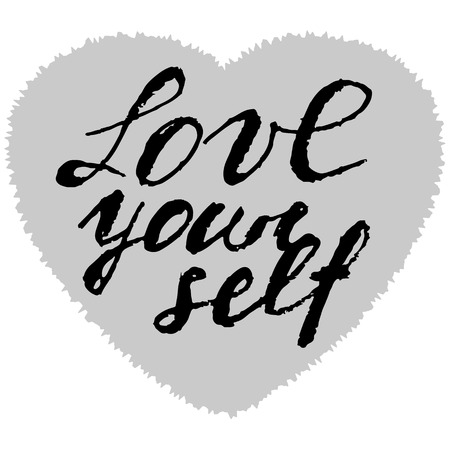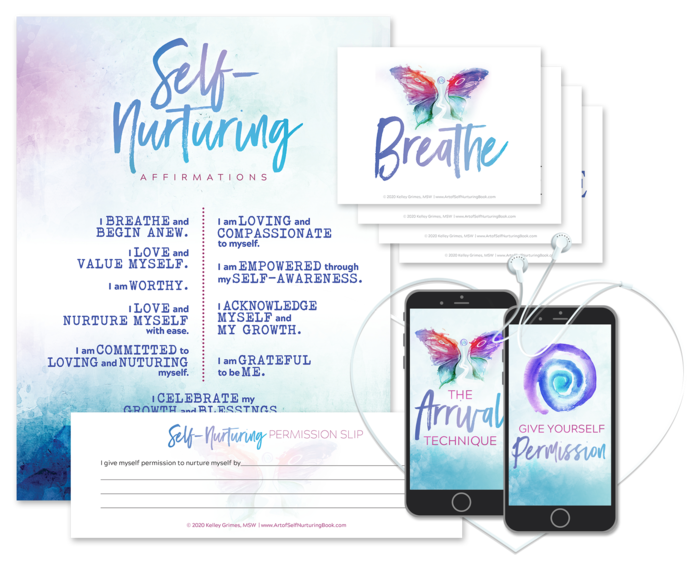 “Self-improvement without self-love is like building a house upon sand. You can build and build, but it will always sink.” ~ Vironika Tugaleva
“Self-improvement without self-love is like building a house upon sand. You can build and build, but it will always sink.” ~ Vironika Tugaleva
Did you set resolutions for the New Year? Were you hoping to exercise more, meditate every day, make healthier choices about what you eat and/or lose weight? Many of us participate in this yearly practice with the intention of nurturing ourselves and yet few of us are able to maintain our resolutions and end up feeling even worse about ourselves. If you can relate to any of this you are not alone.
But what if instead of beating ourselves up for not living up to our aspirations, we choose self-compassion.
You see the start of a new year offers a wonderful opportunity to add new healthy habits into our lives, but the practice of making resolutions tends to be unsustainable. If we are not realistic about our goals, or have the support we need to meet them or the motivation or skills required to maintain our resolutions, they often fall away before becoming habits.
As a result we can end up feeling disempowered or even worse hopeless to create the changes we desire. Here is where self-compassion comes in. When we choose to be understanding and kind to ourselves instead of beating ourselves up, we transform our self-criticism and judgment into self-acceptance and love, which allows space for true change to occur.
One important component of self-compassion is that it offers us an opportunity to acknowledge our own suffering. As humans we have a fundamental need to have our feelings and experiences affirmed and acknowledged but so much of the time we feel unheard and misunderstood instead. Self-compassion allows us to get to the root of our experience by looking first at how we feel. When we meet ourselves there with kindness and love, we can then take the next steps to take care of our suffering.
Another critical aspect of self-compassion is that it allows us to know we are not alone. When we respond with kindness to ourselves when we are suffering, it opens us up to our essential humanness and the understanding that others suffer like us too. Through this recognition we no longer feel so isolated and think there is something inherently wrong with us. Instead we are able to see our common life experience connecting us to others, which in itself can be healing and transformative.
When we choose to respond to our failure with self-compassion and loving kindness, we are much more likely to learn from our experiences and find ways to create positive change in our lives. No sustainable change comes from feeling ashamed. Shame taps us into a feeling of lack and unworthiness, which fuels our defensiveness and inflexibility to adapt or adjust. To cultivate healthy change we need to connect with the essential goodness within us and have that be our inspiration to make positive nurturing changes in our lives.
Another gift of self-compassion is self-awareness. As we approach our lives with more curiosity and non-judgment rather than guilt and shame, we become more and more mindful in our lives. Knowing that we are human, that we are going to make mistakes and that we will be able to learn from our challenges allows us to respond less defensively when we do make a mistake and see the experience as important to our growth. Our failed resolutions then highlight areas to find more support and encouragement for in our lives, truly an opportunity to nurture our selves more deeply.
I love the perspective of self-compassion that expert Kristin Neff shares:
“The nurturing quality of self-compassion allows us to flourish, to appreciate the beauty and richness in life, even in hard times. When we soothe our agitated minds with self-compassion, we’re better able to notice what’s right as well as what’s wrong, so we can orient ourselves toward that which gives us joy.”
Understanding how essential self-compassion is in our process of self-nurturing and recognizing that it has the ability to orient us toward peace and joy, makes our choice of self-compassion easy! Committing to cultivating more self-compassion then becomes the most logical next step in creating positive and sustainable change in our lives.
Today set an intention to respond with self-compassion by:
- Treating yourself with loving kindness
- Asking yourself what you have learned from the process
- Noticing your progress and growth
- Encouraging your self with positivity and self-love.
Remember as the wise Margo Anand writes:
“Loving yourself does not mean being self-absorbed or narcissistic, or disregarding others. Rather it means welcoming yourself as the most honored guest in your own heart, a guest worthy of respect, a lovable companion.” Treating yourself with self-compassion will transform your relationship with yourself and strengthen your ability to nurture peace in the world from the inside out!





I gave up making resolutions years ago. I make promises to myself and I was raised to always keep my promises, even to myself. I ask myself every morning, “what can I do today to make you happy and healthy?”